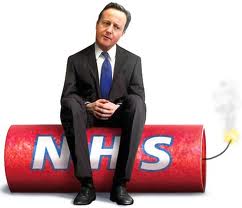Home » Posts tagged 'Katherine Murphy'
Tag Archives: Katherine Murphy
At this stage of the NHS privatisation, the pro-privatisation lobbies get more desperate
I went this evening to the RSA this evening to sit in the front row of the “LBC 97.3 Live at the RSA: Is this the end of the NHS as we know it?” debate. I’ve never seen James O’Brien chair a live debate, but I was genuinely impressed with how he managed to multi-task a live feed from Leicester Square and the debate at the RSA.
Speakers included: Sean Worth, Policy Exchange; Rt Hon Andy Burnham MP, Shadow Health Secretary; Katherine Murphy, chief executive, Patients Association; and Anne McElvoy, public policy and education editor, The Economist.
It seems as if there will, after all, be a window between April 22 2013 – when the Lords return – and May 7 2013, when time for ‘praying’ expires. In that period it will be possible in principle to have the regulations annulled. The regulations otherwise get enacted on 1 April 2013, and they will be implemented at any time thereafter.
With a mild irony, Sean Worth at the last minute took the place of the Government minister, Dr Dan Poulter. What struck me was how Sean Worth was completely undeterred from producing unmitigated garbage, from the perspective of anyone with a good grasp of macroeconomics and English health policy. He accused the Royal Colleges, which have a proud history of maintaining standards in and training of the medical professions, as “hard-left wing”.
This attempt to discredit the Royal Colleges was met with absolute disbelief and laughter from the audience. Whilst previously all stakeholder from the Doctors, in the form of the BMA, has been smeared as ‘left wing’, there is absolutely no evidence to show that the membership of the Royal Colleges have had any political motives. In a free and democratic country, you have to worry profoundly if any dissent at all on policy is due to you being on a different part of the political spectrum. Furthermore, in a totally disingenious argument, he tried to claim that any competition would be on the basis of quality not cost, but that is the whole point; in the absence of any meaningful information from Monitor, and the badly redrafted section 75 regulations, we have absolutely no idea how this “mumbo jumbo” will be put into action, nice though it sounds.
Anne McElvoy’s argument was that involvement of the private sector was to be welcomed, but in the absence of any detail how this would be implemented was utterly infantile. The problem is by producing an odd hybrid of private-public sector, without carefully policy measures, the market will be occupied by a small number of providers. Andy Burnham MP was indeed correct to call it ‘provider led’, because that is EXACTLY the problem with these type of markets with few providers, “oligopolies”, which exist to maximise shareholder dividend. McElvoy indeed shot down her own argument in flames when she tried to argue that she wished to aspire for comprehensive healthcare, while somehow reconciling some degree of rationing. So overall, McElvoy’s argument did not even make sense from a policy sense, let alone economic sense.
Andy Burnham put forward a convincing case for integrated care which concentrated on the “whole person” needs, including physical health, social care and mental care. He was quizzed quite carefully on how the ‘target-led culture’ might have been damaging, but Burnham as usual explained there had been some benefits of implementing targets for waiting times for surgery, for example. Burnham remained deeply apologetic about Mid Staffs, outlining the Government’s official response was tomorrow, but this is where I think he failed to join-up the argument with his original argument. Burnham had been arguing that the effect of the Health and Social Care Act had been to remove the ‘N’ from NHS – this is an extremely important point, as a privatised market, like the railways, will lead to reduced value for the end user, maximised shareholder dividend, and a fragmented service. Fragmentation matters, not least because of abolition of the Health Protection Agency clearly pivotal in public health, but also because of the abolition of the National Patient Safety Agency which was, arguably, even more important in the privatised NHS.
As for Worth’s claim that “competition saves lives”, Worth did not even bother to begin even his evidence for this bold claim, or even refuting a non-competitive service does not save lies (all students of logic will realise this is a false conclusion anyway.) Burnham correctly stated that there has never been any evidence that competition has improved inequality in healthcare outcomes. By that stage, Worth was looking as if he was throwing everything but the kitchen sink at the topic, but the claims sounded progressively more desperate as the evening progressed. All of this will not matter if the Liberal Democrats fail to mount an effective opposition to the new section 75 regulations, even though the legal advice has been that these new regulations will cause a mess in the law courts, with the Liberal Democrats relying on the dubious ‘kitemark’ of quality provided by Baroness Shirley Williams.
1. Sean Worth and “hard left organisations like the Royal Colleges”
Sean Worth describes accurately the starting point that “there are huge pressures on the NHS”; he says that there are “more babies being born and people living longer”. “Costs will rise”, and that there is also a big pressure posed by advances. “£600 million at least comes purely from advances in new medicines, but this costs us a lot of money. Whoever is in government faces the reality that NHS costs are going through the roof. We either put more money in or we reform it.” Worth uses patients to drive the justification for reforms, saying this is “What patients want; the Patients Association are right”. Worth claims that this has been a “big debate”, involving Trade Unions and hard left wing groups like the Royal Colleges”; this appears to have been driven “not out of what people want but because it meets their own needs”. Instead, Worth argues that people (presumably he means patients at this point) “want more choice in the NHS”. Worth claims that people say, “I don’t care who provides the care, all I want is good quality care.” However, Worth states that the discussion has become between Ministers and ideological groups. Worth said he had been part of the Government, and “not many people realise that, while the NHS is brilliant and is one of the best providers in the world, the system is of complete chaos.” Worth says that previously with 1: 5 hip operations having being done by a private firm there had been “no transparency”. Worth believes that patients are attracted by “The Tony Blair argument”, “where there aren’t give private sector perks, there’s a proper level playing field, and with patient choices not politicians driving change.
2. Targets and NHS culture
Burnham argues that bringing in a “top-down reorganisation” was the very worst thing to do at a time when the NHS was facing substantial financial pressures. The ‘reforms’ themselves brought in great instabiity into the workforce, according to Burnham. Mid Staffs was a “dark chapter”, and was a Trust that “lost the plot” when it became a Foundation Trust. Burnham feels that part of how this came about was through the Trust functioning independently. However, Burnham argues that he “brought Francis in” as an independent review, and agreed to all the original Francis recommendations; he adds that he expects Hunt to accept all the recommendations of the second Francis Report on 27 February 2013. McElvoy believes that “structural change is not the be-all-and-end-all”, and that some of the cultural change can be achieved by structural change; however some of the cultural change comes from ‘better management'; targets indeed were a ‘good start’ which were given a “bad name” through Mid Staffs.
3. A need for “comprehensive, universal” care?
McElvoy argues that universal care is a very good “guiding principle”, given that different jurisdictions have different priorities. However, “the NHS cannot do everything”. “We close to our eyes to the fact that a lot of elective treatments are being squeezed out of the NHS”, and McElvoy argues that we need to consider solutions to this (such as “co-payments” introduced by the last Government.”)
4. How do Bevan’s principles apply to the new NHS?
Bevan’s principles “meets the needs of everyone”, “free at the point of delivery” and “not based on an ability to pay”. Worth argues that the reforms “have to be put in place to preserve these principles”, that it is not possible to “keep pouring money” into the NHS; “without reforming these principles are gone”, “competition is not the answer, but in some areas it works’, and concedes competition can work in some areas. “If you want a NHS free-at-the-point-of-use, you have to pay for it, and that is a decision that politicians have to make.” However, Worth wants to avoid a situation of the 1970s, where “the Trade Unions and Labour Party run everything”. Burnham thinks the solution is ‘service reform’ conversely, cites clearly that more competition does not equal more efficiency: in the US, 18% of GDP is paid on healthcare, whereas it is 9% in the UK. Burnham argues that setting national pay levels helps to “keep a control on costs”. O’Brien summarises Burnham’s vision has a potential advantage of a “monolithic organisation”, but Burnham thinks competition introduces “division”. Instead, Burnham argues that a national strategy would help the NHS to be ‘cost-effective’. Worth then says that Labour introduced competition, but Burnham emphasises that he did so to increase ‘competition’.
5. Katherine’s Murphy introduction, including the NHS Patients’ Constitution
Katherine Murphy argues that the NHS Constitution must be “properly promoted”, but there is “little awareness” of it. “Access to services for all” and “not on the basis of an ability to pay” should be important from 1 April 2013. “Patients must have a right to be treated with dignity and respect”, but Murphy explains that still many patients access their confidential helpline. However, Murphy explains that people in the NHS must be “responsible for their actions.” “Patients want to be treated as equal partners”, however “there is a lot of work to be done for the public to understand the new system.” Murphy finally says that she is yet to see any information about what a CCG is, and why this reorganisation was necessary in the first place?
6. Anne McElvoy, a case for reform from a personal perspective
McElvoy explains that the impossible default position is that the NHS “never wants to change”, and it is impossible to keep on giving the NHS money irrespective of other areas. This leads to a situation where you have to make savings. McElvoy has noticed that, after Mid Staffs, “large chunks of the service are failing people”, and interventions are failing. McElvoy believes that “universal treatment can be maintained”. McElvoy says that “Cuba has 2 private hospitals, but we have one”, and that “we are not allowing competition”. “Tony Blair was a good example of seeing an opportunity here”. In conclusion, “things in the NHS are great… bad hospitals should be taken over by better ones.. we need to open it up to more providers… I don’t want a NHS to be run by whistleblowers when things go wrong’.
7. Andy Burnham, with his key criticisms of the Health and Social Care Act (2012)
“This Act removes the N from NHS” appears to be the core message that Andy Burnham wishes to impart to confused members of the public, but Burnham calls it ‘almost illegal’ that the reforms themselves have siphoned £3bn from frontline care as per costs of reorganisation. Burnham argues this on three fronts. Firstly, it removes the duty of the Secretary of State to provide comprehensive universal care, leading to a “postcode lottery”, citing for example the withdrawal of certain cataract operations. Secondly, Burnham believes that the Act legislates for the NHS to begin to mimic the US system, where half of the facilities can now be devoted to private operations, making the system more like the US system. Thirdly, this system mandates “competitive tendering” for all doctors. This is “telling what Doctors to do”, rather than “letting Doctors decide”. “All the evidence from all around the world is that competition does not save money”. “The N in NHS means that you can can save money”. The “recipe given by Sean is a recipe for fragmentation”, but Burnham wants a system represented by integration. With a National Health Service you are able to plan nationally for services, Burnham argues. “Nobody has given this Government to put the NHS up-for-sale.”
8. Patient choice: its importance (from the perspective of the “Patients’ Association”)
Katherine Murphy argues that in the current system “patients have very little choice”. According to Murphy, patients just want to be treated by compassionate doctors in their local hospital. O’Brien says that this is not a choice, and Murphy replies ‘absolutely’. Murphy says there is very little information, e.g. about the complaints mechanisms, about infection rates. Murphy “needs leaders who sign up to the values of the NHS who put the patients at the centre of everything which they do.”
And so the march of the NHS privatisation moves on. Unless the Liberal Democrats support the Fatal Motion,
it is likely that despite the public protest against this policy move (356578 e-signatures and still counting against the section 75 Regulations on “38 degrees”), the next stage of the privatisation plan will have been completed successfully (see here my original article here on this website.)
Please feel free to contact me on @legalaware if you wish to have a constructive debate about any of the issues therein. Many thanks.
Thanks to Caroline Molloy for truly ground-breaking campaigning on this issue: to read her latest blogpost on this blog, please see here.







